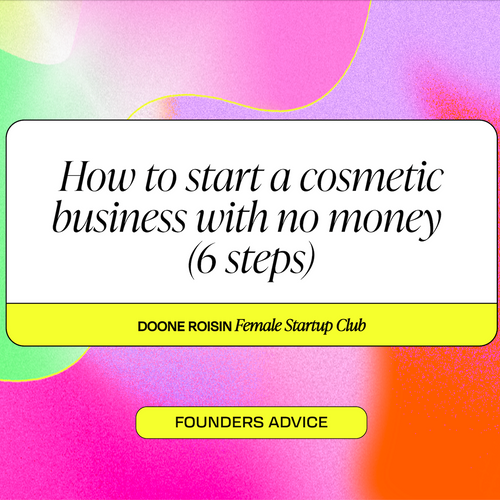When you listen to success stories of female entrepreneurs who have turned abstract ideas into multibillion-dollar businesses, you immediately want to quit your nine-to-five job and start independently. We often discuss how starting a business isn’t easy on the show. We rarely hear the stories of the whopping 20% of startups that fail within the first year. It’s not easy out there. How do you improve your chances and start scaling a business successfully?
Let’s get back to the basics. To start your business as a female founder, it’s essential to come from a place of a strong “why”. What is your true purpose behind starting this brand? We ask founders their “why” in every episode of the show and get many inspiring responses. It can be anything from “I’m really damn passionate about the product” to “I want to make the world a better place”. This is your purpose. The next step is solidifying which problem you are solving and who would benefit from that based on your market research. Once the idea is validated, it’s time to move on to the next steps. Develop a business plan, find capital, and launch your business.
This article is a step-by-step guide to starting your business from scratch. It also covers insights on how to get started with question marks around the money piece, ideas of easy businesses you can start without money, and the right time to start your business. Let’s dive right in.
Steps of Starting a Business as a Female Founder
Regardless of the industry in which you want to operate, below are the general steps you should follow when starting your business:
Create a Business Idea Out of Your Passion
While finding a business idea, you should tap into your passion or an area you're an expert in to identify problems in the market that you can offer solutions for. On the Female Startup Club podcast, we start every conversation with a deep dive into how the guest founder landed on the business idea that they landed. Hearing these stories can motivate you to consider which area you see yourself building in. The common thread through most entrepreneurial stories is a real passion for what the founder is building. Choosing a business idea you're passionate about gives you an intrinsic motivation to pursue your business, even in the face of adversity. Trust me. You’ll need a lot of that in the start-up world.
Here are four points to remember when looking for a business idea. A viable business idea should have the following characteristics:
-
Scalable: It should allow you to grow the business without significantly increasing expenses.
-
Profitable: It's hard for a business to survive without making profits. Your business should start yielding a profit after a predetermined period.
-
It should have a market: Whether your business idea is product, service, or content-based, consumers must be interested in your offerings.
-
It should be unique: Your business idea should be different from other existing businesses to avoid unhealthy competition. As Samantha Brett, the founder of skincare brand Naked Sundays said on the show: “create something that doesn’t exist in the market, you need to find that gap, and you want to get people excited.”
Carry Out Market Research To Validate Your Idea
Getting real with your market research helps you gather information about:
-
Your competitors: Market research helps you to learn about your competitors' strengths and weaknesses, products, delivery, pricing strategy, and whether you'll compete directly or indirectly. Once you have this information, you can re-evaluate how to deliver your product better than theirs. Only when you know what your competitors are up to can you know how to position and differentiate yourself in the market.
-
Your target audience: Researching your target audience helps you understand what they appreciate about the existing products or services and what they’re missing. This information lets you fine-tune your business idea to bridge the current market gaps.
Methods of Carrying Out Market Research
There are many ways to conduct market research. The various ways of gathering information about the market include:
-
Conducting surveys: In this research method, you obtain information directly from the target audience by asking open-ended or closed-ended questions. You can conduct surveys online, in person, or through the mail. In brilliant episode on Female Startup Club, Hailey Russell described getting her first customer feedback for her pet-food brand Chippin’ from taking homemade dog treats to the park and checking out the dog’s reactions. That’s one way to conduct surveys!
-
Analyzing competitors: Today, most companies have an online presence that can be useful for gathering information. Visit their websites to learn their values and social media platforms to read customer reviews.
-
From published sources: You can also gather information from secondary materials such as industry performance reports, statistics, and sales data. Within our private network, Majic, a founder, recently shared a genius tool called AMZScout which gives you businesses Amazon data entirely at your disposal. We can’t get enough of it.
Create a Model Product and Test It on the Market
Before investing your capital in equipment or inventory, you should create a model product to see if it meets your target audience's needs as you anticipated. This is often called your Minimum Viable Product (or MVP). Although this phase may cost you resources, it helps you discover the following:
-
The costs of producing your services or one unit of your product
-
The receptiveness of your products in the market
-
Areas of improvement from customer feedback
This step aims to gain confidence in taking your business idea to the next level. No story shows the importance of creating an MVP quite like Alexandra Fine’s first model of a Dame product. You might want to sit down for this one. When Alex first came up with the idea of creating a brand that would revolutionize sex toys, she started making vibrator prototypes in the comfort of her own kitchen. These prototypes then did the rounds with her friends, and there you had it: her first customer feedback. If Alex can make sex toy prototypes in her kitchen, you can do it too.
Compile a Business Plan
Currently, 90% of startups fail because they lack a defined plan for executing their goals. To reduce the risk of failure, you should prepare a business plan to outline why your business exists, what it'll be doing, and how it will execute processes to meet the desired goals.
This will also help you to obtain funds. Most investors and financiers will want to look at your business plan to determine whether your business has the potential to generate positive cash flows in the future. When Jaclyn Johnson, founder of VC fund New Money Ventures, was a guest of the Female Startup Club, she highlighted the importance of business plans in getting people excited about the vision of your business (it gets down to storytelling and marketing opportunities, creating the most significant possible picture).
Below is a YouTube video from Young Entrepreneurs Forums explaining how to write a business plan step-by-step:
Gather Your Finances and Set a Budget
Having sufficient starting capital largely contributes to the success of a business. First, you'll need to perform a cost analysis and determine the fixed and variable monthly costs you'll incur to produce your product and meet operational expenses.
Remember, it may take time before your business starts to make profits. However, it should be able to operate at break-even where the costs are equal to revenue, and there's no profit or loss. To avoid unnecessary strain or anxiety, you should have enough money to support the business for 3 to 6 months until it generates enough profits to pay yourself a salary.
If bootstrapping is not enough to fund your business, you can look for other options, including:
-
Crowdfunding (learn all about crowdfunding from Mamamade founder Sophie Baron right here)
-
Bank borrowing
-
Obtaining incubator funds
-
Venture capital investing (learn all about what VC funds are looking for from Jaclyn Johnson from New Money Ventures right here)
Launch Your Business
The first legal requirement when launching your business is choosing a structure. Although a sole proprietorship is easier because it requires fewer formalities, it's risky because it has no separate legal entity.
You should consider launching your business as a corporation or limited liability company to protect your personal assets from creditors should your business get into debt.
Also, you should ensure compliance with other legal requirements, such as applying for insurance coverage and an Employer Identification Number for tax purposes.
How Can You Get Started Today Without Any Money?
A popular belief in the business world is that you need money to make money. However, technology has made it easier for entrepreneurs to bring their ideas to life even with no capital. So, if you have a business idea and have no money, you don't have to give up on your dream.
You can start today without money by choosing a content or service-based business you know about and setting up an online presence with your existing resources. Also, use free digital marketing tools such as Buffer for advertising to your target audience.
For such a business, you only need a laptop or a smartphone to build your website, where your target audience can find more information about your services.
Remember that you may need to keep your current day job and concentrate on your business in your free time after work or during the weekend. This will keep you from getting into debt before your business establishes itself properly. Once you make enough profit to support your monthly bills, you can transition and give your business your full and undivided attention. In this exact way, the founder of the beauty brand Delhicious, Zara Saleem, managed to build the brand from just £250 at her kitchen table to garnering a 50,000-person waitlist for her products. She worked as a teacher until the business made enough money to support her, along with a generous buffer.
The Easiest Businesses To Start With No Money
If you’re running out of ideas for businesses you can start without money, you can consider the following:
-
Blogging and content creation: If you enjoy writing and are knowledgeable about a particular field, such as finance, beauty, or health, among others, you can start a writing business and monetize your content through ads, affiliate links, and subscriptions - many of the founders from the show such as Erim and Sarah Ashcroft started their entrepreneurial journey this way before diving into product-based business.
-
Hand-made products: Creating products yourself with save you on those manufacturing costs and allow you to build up some traction and capital before investing in outsourcing any services. That’s how Sara Berks first kicked things off with home goods store MINNA, creating all the items by hand. Learn more about her story on Female Startup Club.
-
Selling digital products: Digital products are becoming popular because of their ease of distribution and ability to be sold repeatedly without replenishing resources. They include ebooks, online courses, and music, which you can freely sell on your website or platforms like Udemy. Creator courses such as those curated by Ellen Yin from Cubicle to CEO have seen immense success in the last year from selling digital products. You can learn about the nitty gritty of this approach to building a business right here.
-
Graphic design: Today, most companies are incorporating visual content in their marketing mix, which has increased the demand for graphic designers. You can start your business free by marketing your skills online if you have excellent skills in this field.
-
Virtual assistant services: This business requires you to remotely perform administrative tasks for companies and individuals. You only need an internet connection and a laptop to get started. You need no licensing or education to work across multiple industries, but you should have excellent administrative skills.
When Should You Start a Business?
Starting a business is like planning to have a baby. There's never a time when you'll feel fully prepared to take the leap. So, when is a good time to start one?
You should start a business by testing your idea and discovering its market feasibility. That is, it solves a specific problem in the market, and consumers are craving your solution. With a well-executed plan and passionate motivation, you'll see your business bloom.
Also, you should ensure you feel internally prepared to take up the challenges of a startup, such as working long hours and dealing with unforeseen risks. Realistically, there will always be reasons to start a business and many more reasons not to. If this is the right path for you, then you will forge that path. Pre-biotic soda brand Poppi’s founder, Allison Ellsworth, is an excellent reminder.
She had just moved house and was three months pregnant when she convinced her husband to give up his job and embark upon this journey with her. Five years, three kids, and a $25M raise later, they never look back.
Final Thoughts
There is so such thing as an easy road to success. All great female founders, even all female founders, had to follow the above steps to achieve their business dreams. But remember, the success of a business does not happen overnight. It may take years before you get to the top of the ladder. So, you must persevere and remain consistent until you see results. As we often say on the show, there is no such thing as overnight success.
If you liked this ultimate guide to starting a business as a female founder you might also like the weekly Female Startup Club Newsletter, which features the incredibly inspiring stories of 400+ female founders we have interviewed.



